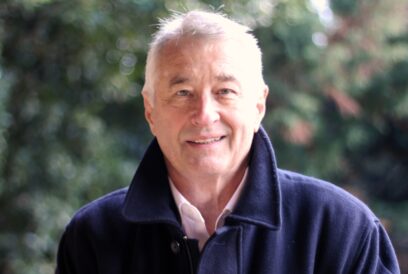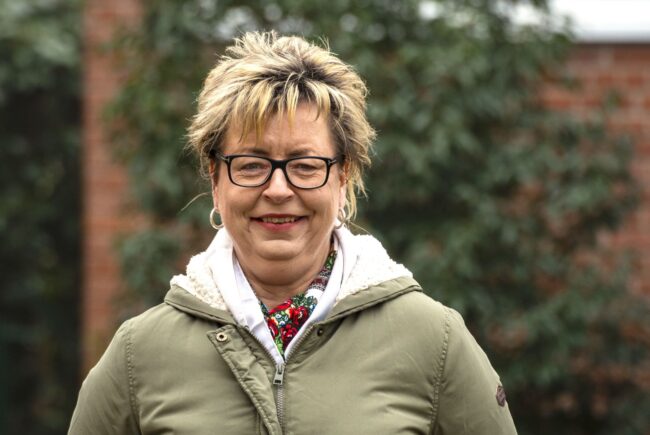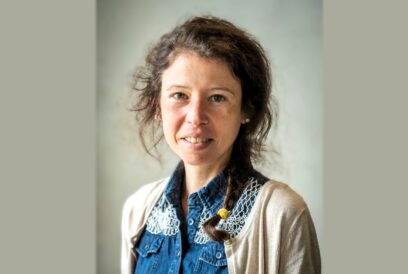

Stefanie Gebing-Menzen, an educator at Akademie Klausenhof, regularly organises workshops for people with disabilities on topics such as elections and fake news. Photo: Akademie Klausenhof.
Stefanie Gebing-Menzen, an educator at Akademie Klausenhof, regularly organises workshops for people with disabilities on topics such as elections and fake news. Photo: Akademie Klausenhof.
A German initiative offers citizenship education to people with disabilities, fostering their active participation in political life. “I've realised what rights I have and that my opinion counts,” says one student.
“Yes, I’d like to learn more. About politics too! How to vote properly, which parties there are, and who is doing something for people with disabilities.”
Martin (name changed) lives in an institution called Lebenshilfe Unterer Niederrhein in Germany. He enjoys living in the institution’s facility, which is one of around 2,750 facilities for people with disabilities in Germany, offering residential care in residential groups, work in workshops, catering, leisure activities and individual support.
“It’s nice here. I know that I need support. I get it here.”
The institution helps him to cope with everyday life, including voting. Martin is interested in politics, not only related to his own concerns and neighbourhood issues, but also political and social developments in general, just like anyone.
Until five years ago, however, he was unable to voice his political opinion in elections, because until then it was not legally possible for people with disabilities who are under full care to vote in Germany. He has only been allowed to vote since 2019, when the laws on inclusion were changed.
Discrimination starts with differentiation
Stefanie Gebing-Menzen is an experienced educator specialised in citizenship education for people with disabilities. She works at Akademie Klausenhof, an institute for adult education.
Gebing-Menzen is involved in a project that develops and implements special educational programmes for people with disabilities in Germany.
“For me, in political education, it makes no difference which group we’re working with – whether with or without disabilities. For me, discrimination starts with this distinction.”
In political education, it makes no difference which group we’re working with.
The pilot project “How does democracy work? Inclusive democracy education for teenagers and young adults with intellectual disabilities” is funded by the German Federal Ministry for Family Affairs, Senior Citizens, Women and Youth, and runs until the end of 2024.
“In Germany, it is difficult for those who are affected to understand that, for example, they only receive a very small amount of pocket money although they work regularly in a workshop that sells its products at a normal market price – and trade unions are not allowed to be active in such cases. So, who in politics is actually campaigning for more inclusion and better pay? How could I put such an issue on the political agenda?”
Engagement and empowerment
“In this project, participants learn and experience how they can get involved in politics themselves. The basis is the ability to obtain the right information, not to fall for fake news and to form their own opinions. Some want to become more actively involved in politics.”
This includes, for example, representing their own position to those in positions of responsibility in the workplace.
The basis is the ability to obtain the right information.
“Democratic principles and forms of participation must be cultivated and used here, just as they are in all other companies,” emphasises Gebing-Menzen.
The appropriate term for this is ‘empowerment’. Through the project, people who previously lacked political rights experience what politics, democracy and political participation mean, including the fact that individual opinions and wishes sometimes cannot be realised – especially if they belong to a social group that is largely without a lobby and political power. This is why it is particularly important to implement resilience as an educational goal for these people as a counter-concept to empowerment.
Fighting for the rights
As part of the project, Gebing-Menzen regularly organises workshops and activities in cooperation with various workshops for people with disabilities. These typically involve around 20 participants, and tackle topics such as election programmes and fake news. Each event is organised in such a way that democratic principles such as co-determination, participation, sensitivity for others and tolerance are observed and addressed.
As part of one project, the participants made a professional video in which people with disabilities explain the importance of elections. Excursions to Berlin and meetings with members of parliament are also part of the programme.
An important part of the project is ensuring accessibility. For example, plain language is used in conferences and publications, and venues are selected so that they are accessible to everyone.
“It is impressive to see how the participants engage with the topic, and the intensity with which most of them participate. It is clear that they are standing up for their own rights as people with disabilities.”
They are standing up for their own rights as people with disabilities.
“In the care centres on the other hand, they feel that they are subject to fixed rules and narrow boundaries that are difficult to break through and offer little freedom for individual development. This starts with the low pay and ends with the lack of opportunities for further training,” says Gebing-Menzen.
A whole new world opens up for most of them. Martin is convinced that the project has also helped him personally: “I’ve realised what rights I have and that my opinion counts.”
Author







